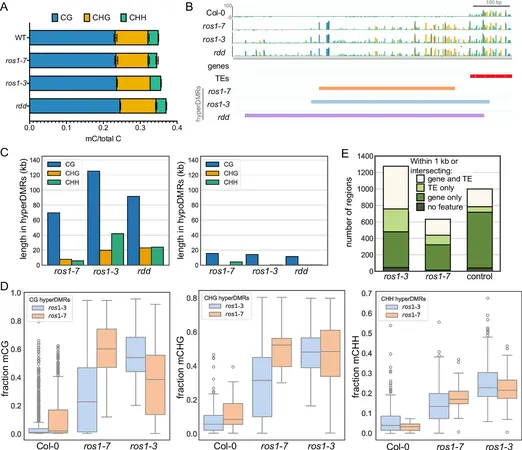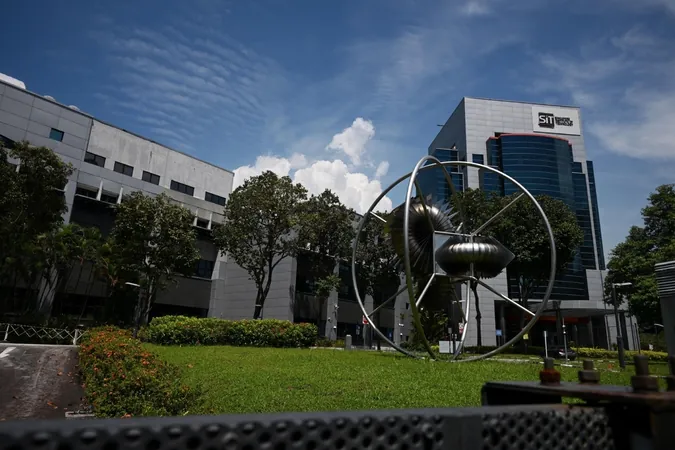
Unlocking the Secrets of DNA Methylation: How ROS1 Safeguards the Paternal Genome in Arabidopsis Endosperm
2025-09-18
Author: Rajesh
Introduction: The Role of ROS1 in DNA Methylation
Recent research reveals that ROS1, a key player among 5-methylcytosine DNA glycosylases, significantly influences DNA methylation patterns within Arabidopsis endosperm. This enzyme's unique ability to prevent paternal genome hypermethylation underscores its critical role in plant epigenetics.
Understanding the Mechanisms Behind DNA Methylation Patterns
In a groundbreaking investigation, researchers employed enzymatic-methyl sequencing (EM-seq) to analyze the effects of ROS1 and related glycosylases on endosperm DNA methylation. They discovered that in the absence of ROS1, a substantial increase in methylation was observed compared to the wild type, particularly within CG and CHG contexts. This highlights the enzyme's essential function in maintaining a balanced methylation landscape.
The Significance of Differentially Methylated Regions (DMRs)
Analyzing DMRs revealed over 1,600 distinct regions affected by the loss of ROS1 activity, further emphasizing the enzyme's unique role. Most DMRs exhibited heightened methylation in ROS1-deficient endosperm, suggesting that it is crucial for preventing unwanted methylation spread from transposable elements (TEs). This protective function of ROS1 enables precise regulation of gene expression in developing seeds.
How ROS1 Renders the Paternal Genome Resilient to Hypermethylation
What sets ROS1 apart is its specific action on the paternal genome. By conducting allele-specific whole-genome sequencing, scientists discerned that in the wild type, both maternal and paternal alleles displayed high correlation in methylation levels. In contrast, this correlation broke down in ROS1 mutants, primarily due to paternal allele hypermethylation. The findings suggest that ROS1 is essential not only for maintaining genomic integrity but also for ensuring equitable expression of paternal traits in the next generation.
Genetic Insights: ROS1 and DME as Epigenetic Guardians
The interplay between ROS1 and DME—another critical demethylase—reveals a sophisticated mechanism governing DNA methylation. While DME operates on maternal alleles, ROS1 predominantly safeguards paternal alleles from hypermethylation. This dual strategy ensures a balanced epigenetic state in the endosperm, fostering optimal gene expression and plant development.
Future Directions: Elucidating the Full Potential of ROS1
The intricate dynamics of DNA methylation spreading and the roles of small RNAs in this process remain areas ripe for exploration. Further research promises to uncover additional layers of regulation and the potential for harnessing these mechanisms to improve crop resilience and yield.
Conclusion: The Power of ROS1 in Plant Genetics
Understanding how ROS1 distinctly manages paternal genome hypermethylation opens new avenues in plant genetics and breeding strategies. This knowledge could prove vital in enhancing crop performance and adaptability in the face of environmental challenges.



 Brasil (PT)
Brasil (PT)
 Canada (EN)
Canada (EN)
 Chile (ES)
Chile (ES)
 Česko (CS)
Česko (CS)
 대한민국 (KO)
대한민국 (KO)
 España (ES)
España (ES)
 France (FR)
France (FR)
 Hong Kong (EN)
Hong Kong (EN)
 Italia (IT)
Italia (IT)
 日本 (JA)
日本 (JA)
 Magyarország (HU)
Magyarország (HU)
 Norge (NO)
Norge (NO)
 Polska (PL)
Polska (PL)
 Schweiz (DE)
Schweiz (DE)
 Singapore (EN)
Singapore (EN)
 Sverige (SV)
Sverige (SV)
 Suomi (FI)
Suomi (FI)
 Türkiye (TR)
Türkiye (TR)
 الإمارات العربية المتحدة (AR)
الإمارات العربية المتحدة (AR)